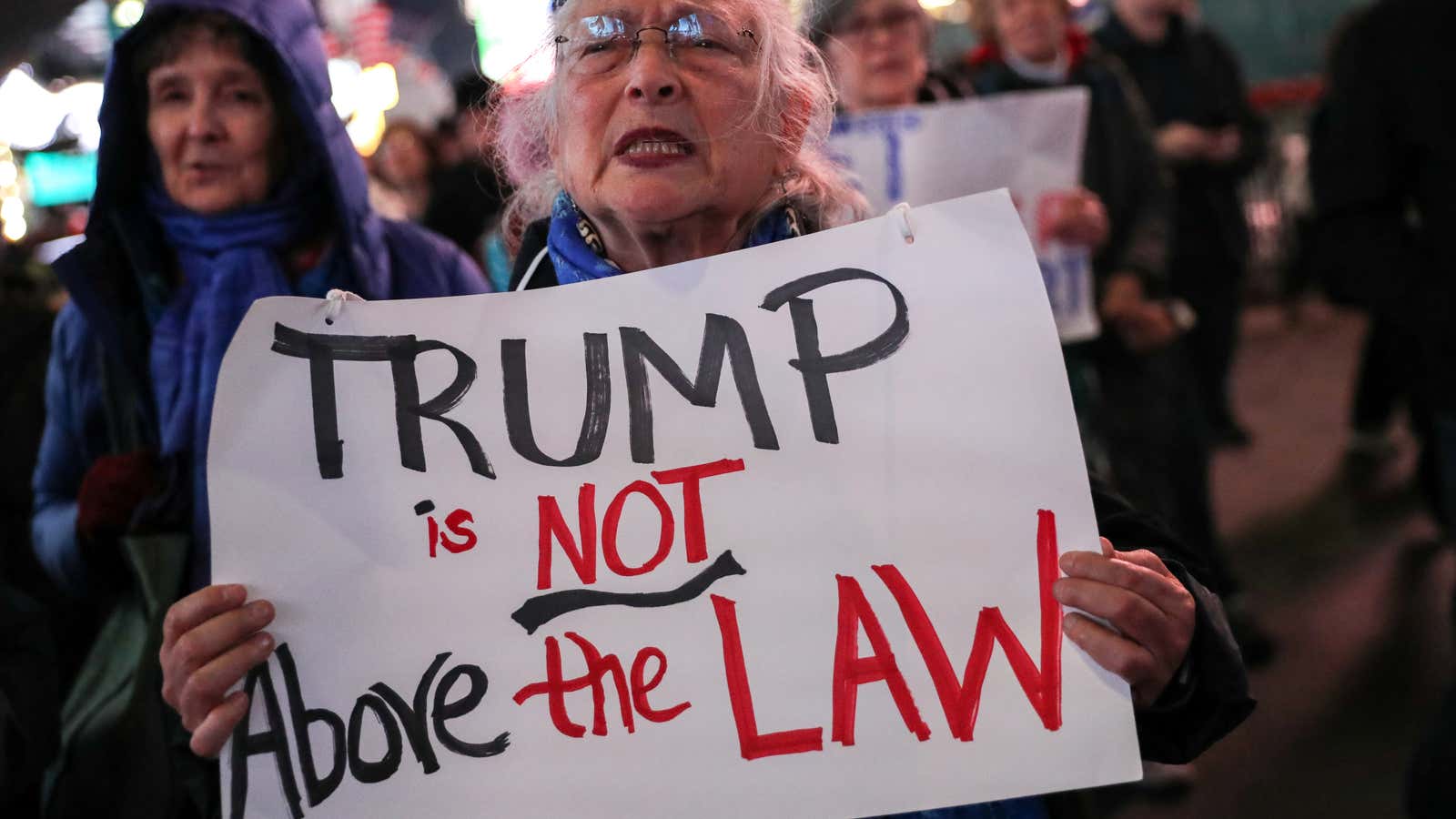Every year, the world regularly grapples with what is fair, reasonable, and right. But those concepts took center stage in 2018, as high-profile US political proceedings like the Supreme Court confirmation hearings of Brett Kavanaugh and special counsel Robert Mueller’s ongoing investigation into Donald Trump’s presidential campaign captured the nation’s attention.
With that backdrop, it makes sense that the Merriam-Webster dictionary’s word of the year is “justice.”
The word of the year is based on the total volume of search traffic and a year-on-year increase in lookups, Peter Sokolowski, Merriam-Webster’s editor at large, told the Associated Press. People consulted the entry for “justice” 74% more this year than in 2017.
On its website, Merriam-Webster explains, “the concept of justice was at the center of many of our national debates in the past year: racial justice, social justice, criminal justice, economic justice.”
Since the word has “meanings that range from the technical and legal to the lofty and philosophical,” it’s important to understand how the word fits into the conversation.
Special counsel Mueller’s investigation is carried out by the Department of Justice, for instance, and the questions about whether the actions of political figures—including Trump—constituted the obstruction of justice are also in the spotlight. (The Justice Department is also often referred to as just “Justice” in many of Trump’s tweets.)
At Kavanaugh’s widely watched confirmation hearings, which drew unusual levels of interest because of the sexual assault allegations made against him by psychology professor Christine Blasey Ford, the word “justice” was frequently used because it is the title used for judges appointed to the Supreme Court (and no doubt because Blasey Ford’s testimony, which was seen as an important move for women’s rights, raised other questions about justice).
Search traffic for “justice” also spiked when Trump took to Twitter on Aug. 1 and asked then-attorney general Jeff Sessions to stop what he called a “rigged witch hunt;” the US president was referring to efforts to find evidence that he obstructed justice (paywall). Lookups for Merriam-Webster’s entry for “obstruction of justice” increased 900% that day compared to the same date in 2017, the AP notes. And after Trump announced at an Oct. 22 rally in Texas, “I’m a nationalist […] Use that word,” searches for “nationalism”—which Merriam-Webster identified as 2018’s next most-defining word—spiked 8,000% that day and the next compared to the same dates in 2017.
Politics fueled several other search terms that made Merriam-Webster’s list of the most trending words of 2018, including “lodestar” (which was used by a senior official in the Trump campaign who penned an anonymous New York Times op-ed highly critical of the president) and “feckless” (which was used by the comedian Samantha Bee in an unflattering description of Trump’s daughter Ivanka).
But the list wasn’t all politics-driven. The terms “pansexual,” “respect,” and “Excelsior” also made the top 10; the spikes in popularity for the latter two were triggered by the deaths of Aretha Franklin and Stan Lee respectively.
How did other lexicographers sum up the year? Dictionary.com’s word of the year for 2018 is “misinformation,” due to how the rise of misinformation has affected the public perception of mainstream media both within the US and beyond. The Oxford English Dictionary’s pick this year was “toxic”—which was heavily searched alongside “masculinity.”
On a more positive note, Collins Dictionary’s word of the year is “single-use,” which might suggest how wasteful people are, but also shows that people are at least thinking more about their wastefulness, and maybe doing something to change it. Similarly, it’s important to discuss ideas like toxicity, misinformation, and justice. And in trying to better understand those concepts, say, by looking in the dictionary, people are at least trying to get it right.
